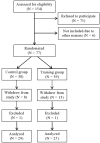Effectiveness of Working Memory Training among Subjects Currently on Sick Leave Due to Complex Symptoms
- PMID: 28111555
- PMCID: PMC5216020
- DOI: 10.3389/fpsyg.2016.02003
Effectiveness of Working Memory Training among Subjects Currently on Sick Leave Due to Complex Symptoms
Abstract
Introduction: The current study examined if adaptive working memory training (Cogmed QM) has the potential to improve inhibitory control, working memory capacity, and perceptions of memory functioning in a group of patients currently on sick leave due to symptoms of pain, insomnia, fatigue, depression and anxiety. Participants who were referred to a vocational rehabilitation center volunteered to take part in the study. Methods: Participants were randomly assigned to either a training condition (N = 25) or a control condition (N = 29). Participants in the training condition received working memory training in addition to the clinical intervention offered as part of the rehabilitation program, while participants in the control condition received treatment as usual i.e., the rehabilitation program only. Inhibitory control was measured by The Stop Signal Task, working memory was assessed by the Spatial Working Memory Test, while perceptions of memory functioning were assessed by The Everyday Memory Questionnaire-Revised. Results: Participants in the training group showed a significant improvement on the post-tests of inhibitory control when compared with the comparison group (p = 0.025). The groups did not differ on the post-tests of working memory. Both groups reported less memory problems at post-testing, but there was no sizeable difference between the two groups. Conclusions: Results indicate that working memory training does not improve general working memory capacity per se. Nor does it seem to give any added effects in terms of targeting and improving self-perceived memory functioning. Results do, however, provide evidence to suggest that inhibitory control is accessible and susceptible to modification by adaptive working memory training.
Keywords: adaptive working memory training; complex symptoms; inhibitory control; self-perceived memory functioning; spatial working memory.
References
-
- Alloway T. P., Bibile V., Lau G. (2013). Computerized working memory training: can it lead to gain in skills in students. Comput. Human Behav. 29, 632–638. 10.1016/j.chb.2012.10.023 - DOI
LinkOut - more resources
Full Text Sources
Other Literature Sources
Medical


